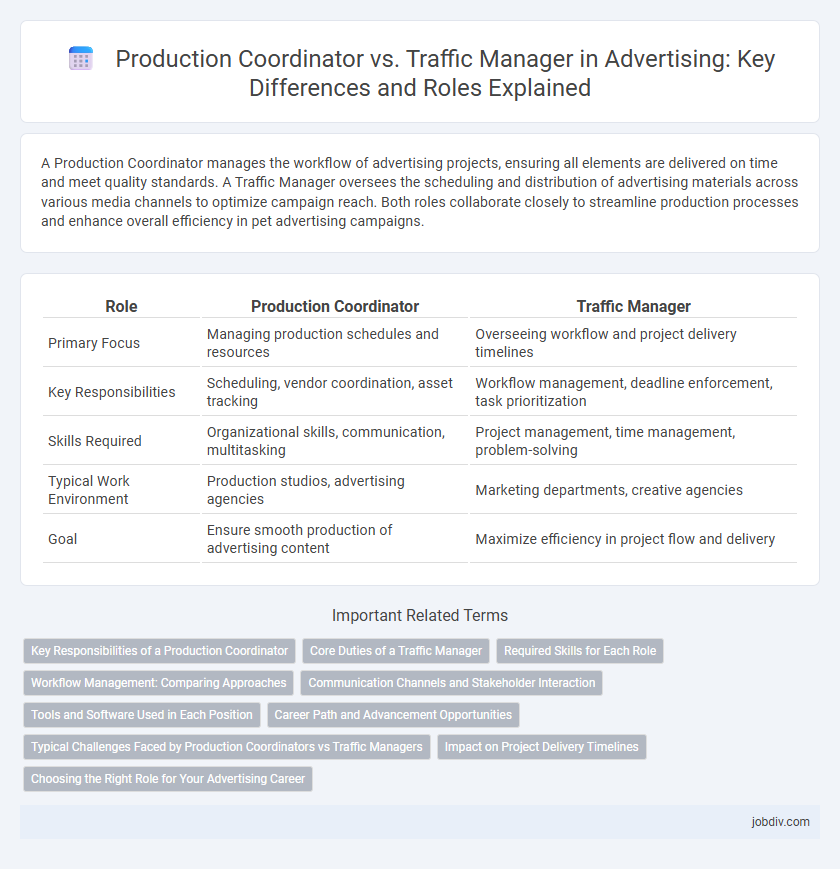A Production Coordinator manages the workflow of advertising projects, ensuring all elements are delivered on time and meet quality standards. A Traffic Manager oversees the scheduling and distribution of advertising materials across various media channels to optimize campaign reach. Both roles collaborate closely to streamline production processes and enhance overall efficiency in pet advertising campaigns.
Table of Comparison
| Role | Production Coordinator | Traffic Manager |
|---|---|---|
| Primary Focus | Managing production schedules and resources | Overseeing workflow and project delivery timelines |
| Key Responsibilities | Scheduling, vendor coordination, asset tracking | Workflow management, deadline enforcement, task prioritization |
| Skills Required | Organizational skills, communication, multitasking | Project management, time management, problem-solving |
| Typical Work Environment | Production studios, advertising agencies | Marketing departments, creative agencies |
| Goal | Ensure smooth production of advertising content | Maximize efficiency in project flow and delivery |
Key Responsibilities of a Production Coordinator
A Production Coordinator in advertising manages project timelines, coordinates communication between creative teams, and oversees resource allocation to ensure smooth workflow throughout the production process. They handle scheduling, track project progress, and facilitate collaboration among designers, copywriters, and external vendors. This role is critical in maintaining efficiency and meeting deadlines within advertising campaigns.
Core Duties of a Traffic Manager
A Traffic Manager in advertising oversees the efficient flow of projects from creative teams to media buyers, ensuring deadlines are met and resources are allocated effectively. Core duties include scheduling, tracking campaign progress, and resolving bottlenecks to maintain smooth workflow across departments. This role demands strong organizational skills and communication to synchronize efforts between production, creative, and account management teams.
Required Skills for Each Role
Production Coordinators excel in project management, communication, and scheduling, ensuring seamless execution of advertising campaigns from concept to delivery. Traffic Managers specialize in workflow optimization, resource allocation, and deadline adherence, coordinating between creative teams and media outlets to maximize efficiency. Mastery of software tools like project management platforms for Production Coordinators and traffic tracking systems for Traffic Managers enhances their effectiveness in managing advertising projects.
Workflow Management: Comparing Approaches
Production Coordinators streamline the advertising workflow by overseeing project timelines, resource allocation, and vendor communications to ensure smooth production processes. Traffic Managers focus on scheduling and tracking the movement of creative assets through various departments, optimizing task prioritization and deadline adherence. Both roles complement each other by enhancing operational efficiency and ensuring timely delivery of advertising campaigns.
Communication Channels and Stakeholder Interaction
Production Coordinators streamline communication channels between creative teams, vendors, and clients to ensure timely delivery of advertising materials. Traffic Managers oversee the flow of information and approvals across departments, optimizing stakeholder interactions to prevent bottlenecks in campaign schedules. Efficient coordination and clear communication lines maintained by both roles are crucial for seamless project execution and client satisfaction in the advertising industry.
Tools and Software Used in Each Position
Production Coordinators in advertising primarily utilize project management tools like Asana, Trello, and Adobe Creative Cloud to coordinate schedules, manage budgets, and streamline creative workflows. Traffic Managers rely heavily on traffic management software such as Workamajig, Mediaocean, and Celoxis to monitor job progress, allocate resources, and ensure timely delivery of advertising materials. Both roles integrate communication platforms like Slack and Microsoft Teams but focus on different software to optimize project execution and campaign delivery.
Career Path and Advancement Opportunities
Production Coordinators in advertising oversee project schedules, manage resources, and coordinate communication between creative teams and clients, building foundational skills for roles in project management or production supervision. Traffic Managers focus on workflow optimization, ensuring timely delivery of advertising materials by managing task assignments and identifying bottlenecks, which often leads to advancement into operations management or traffic directing roles. Both career paths offer growth opportunities in leadership positions, with Production Coordinators gaining broader creative oversight and Traffic Managers developing expertise in process efficiency and resource allocation.
Typical Challenges Faced by Production Coordinators vs Traffic Managers
Production Coordinators commonly face challenges such as managing tight deadlines, coordinating between creative teams and vendors, and ensuring accurate resource allocation for advertising projects. Traffic Managers typically struggle with scheduling conflicts, balancing workload distribution across departments, and maintaining seamless communication to prevent bottlenecks in campaign execution. Both roles require exceptional organizational skills but differ in focus: Production Coordinators emphasize project workflow, while Traffic Managers concentrate on optimizing operational efficiency.
Impact on Project Delivery Timelines
Production Coordinators streamline creative processes by managing schedules and resource allocation, ensuring timely completion of advertising assets. Traffic Managers oversee the workflow between departments, prioritizing tasks and preventing bottlenecks to maintain project momentum. Efficient collaboration between both roles significantly reduces delays, accelerating overall project delivery timelines.
Choosing the Right Role for Your Advertising Career
Production coordinators in advertising oversee project timelines, coordinate with creative teams, and manage resource allocation to ensure campaigns are delivered on schedule and within budget. Traffic managers specialize in workflow optimization by assigning tasks, monitoring project progress, and facilitating communication between departments to streamline the advertising production process. Selecting the right role depends on your strengths: opt for production coordination if you excel in project management and detail-oriented organization, or choose traffic management if you thrive in process optimization and cross-team communication.
Production Coordinator vs Traffic Manager Infographic

 jobdiv.com
jobdiv.com